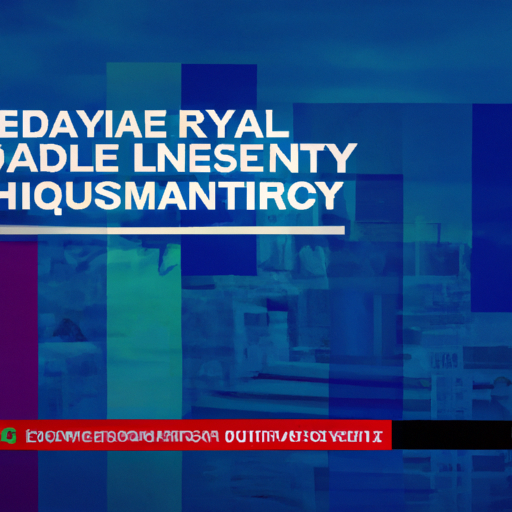
The Importance of Revenue Management Strategy in the Hospitality Industry
The hospitality industry is a highly competitive field, with hotels, restaurants, and other establishments constantly vying for customers. In order to stay ahead of the competition, it is crucial for businesses to have a solid revenue management strategy in place. This is where the EHL Graduate School’s new half-day course on revenue management strategy comes in.
Revenue management strategy involves the strategic pricing and allocation of resources to maximize revenue and profitability. It is a complex process that requires a deep understanding of market dynamics, customer behavior, and industry trends. By implementing an effective revenue management strategy, businesses can optimize their pricing, inventory, and distribution channels to drive revenue growth.
One of the key benefits of a revenue management strategy is the ability to increase profitability. By carefully analyzing market demand and adjusting prices accordingly, businesses can ensure that they are charging the right price for their products or services. This not only helps to maximize revenue, but also ensures that businesses are not leaving money on the table by undercharging for their offerings.
Another important aspect of revenue management strategy is inventory management. By effectively managing inventory, businesses can avoid overbooking or underbooking, which can lead to lost revenue or dissatisfied customers. Through the use of advanced forecasting techniques and data analysis, businesses can accurately predict demand and adjust their inventory levels accordingly. This helps to ensure that businesses have the right amount of inventory on hand to meet customer demand, while minimizing costs associated with excess inventory.
In addition to pricing and inventory management, revenue management strategy also involves optimizing distribution channels. This includes determining the most effective channels to reach target customers and maximizing revenue from each channel. By understanding customer preferences and behavior, businesses can tailor their distribution strategies to reach customers where they are most likely to make a purchase. This could involve partnering with online travel agencies, implementing direct booking strategies, or leveraging social media platforms to reach a wider audience.
The EHL Graduate School’s new half-day course on revenue management strategy is designed to provide professionals in the hospitality industry with the knowledge and skills needed to develop and implement effective revenue management strategies. The course covers a wide range of topics, including pricing strategies, demand forecasting, inventory management, and distribution channel optimization.
Participants will learn how to analyze market data, identify trends, and make informed decisions to drive revenue growth. They will also have the opportunity to learn from industry experts and network with other professionals in the field. By the end of the course, participants will have a solid understanding of revenue management strategy and be equipped with the tools and techniques needed to implement it in their own businesses.
In conclusion, revenue management strategy is a critical component of success in the hospitality industry. By implementing an effective strategy, businesses can optimize pricing, inventory, and distribution channels to maximize revenue and profitability. The EHL Graduate School’s new half-day course on revenue management strategy provides professionals in the industry with the knowledge and skills needed to develop and implement effective strategies. Whether you are a hotel manager, restaurant owner, or hospitality professional, this course is a valuable opportunity to enhance your revenue management skills and stay ahead of the competition.
How EHL Graduate School’s Half-Day Course Enhances Revenue Management Skills

EHL Graduate School, one of the leading hospitality management schools in the world, is excited to introduce a new half-day course on revenue management strategy. This course is designed to enhance the revenue management skills of professionals in the hospitality industry, providing them with the knowledge and tools they need to optimize revenue and maximize profitability.
Revenue management is a critical aspect of running a successful hotel or restaurant. It involves analyzing data, understanding market trends, and making strategic decisions to maximize revenue. With the ever-changing landscape of the hospitality industry, it is essential for professionals to stay up-to-date with the latest revenue management techniques.
The half-day course offered by EHL Graduate School is a perfect opportunity for professionals to enhance their revenue management skills in a short amount of time. The course covers a wide range of topics, including pricing strategies, demand forecasting, inventory management, and distribution channels. Participants will learn how to analyze market data, identify revenue opportunities, and implement effective strategies to drive revenue growth.
One of the key benefits of this course is its practical approach. Participants will have the opportunity to work on real-world case studies and simulations, allowing them to apply their knowledge and skills in a hands-on environment. This practical experience will not only enhance their understanding of revenue management concepts but also prepare them to tackle real-world challenges in their own organizations.
In addition to the practical aspect, the course also provides participants with access to industry experts and thought leaders. These experts will share their insights and experiences, providing valuable guidance and advice. Participants will have the opportunity to network with these experts and fellow professionals, creating valuable connections that can benefit their careers in the long run.
Furthermore, the course is designed to be flexible and accessible. It is offered in a half-day format, allowing professionals to fit it into their busy schedules. Whether they are working full-time or part-time, they can easily attend the course without disrupting their work commitments. Additionally, the course is available both on-campus and online, providing participants with the flexibility to choose the learning format that suits them best.
By attending this half-day course, professionals can expect to gain a competitive edge in the industry. Revenue management skills are highly sought after by employers, and professionals who possess these skills are more likely to advance in their careers. Whether they are looking to move up the corporate ladder or start their own business, the knowledge and skills gained from this course will undoubtedly be valuable.
In conclusion, EHL Graduate School’s half-day course on revenue management strategy is a fantastic opportunity for professionals in the hospitality industry to enhance their revenue management skills. With its practical approach, access to industry experts, and flexible format, this course provides participants with the knowledge and tools they need to optimize revenue and maximize profitability. By attending this course, professionals can gain a competitive edge and advance their careers in the ever-changing landscape of the hospitality industry.
Key Benefits of Implementing Revenue Management Strategy in Hotel Operations
Are you a hotel professional looking to enhance your revenue management skills? Look no further! The EHL Graduate School is excited to introduce a new half-day course on revenue management strategy. In this article, we will explore the key benefits of implementing revenue management strategy in hotel operations.
First and foremost, implementing a revenue management strategy can significantly increase a hotel’s profitability. By effectively managing room rates and inventory, hotels can optimize revenue and maximize their bottom line. This is especially important in today’s competitive market, where hotels are constantly vying for guests and striving to stand out from the crowd. With a solid revenue management strategy in place, hotels can ensure that they are pricing their rooms appropriately and capturing the maximum revenue potential.
Another key benefit of revenue management strategy is the ability to forecast demand accurately. By analyzing historical data and market trends, hotels can predict future demand and adjust their pricing and inventory accordingly. This allows hotels to optimize their revenue by selling the right room, to the right guest, at the right price, and at the right time. By accurately forecasting demand, hotels can avoid overbooking or underbooking, which can lead to lost revenue or dissatisfied guests. Instead, they can make informed decisions that maximize revenue and guest satisfaction.
Furthermore, implementing a revenue management strategy can help hotels improve their overall guest experience. By effectively managing room rates and inventory, hotels can ensure that they are offering competitive prices and availability to their guests. This not only attracts more guests but also enhances their experience by providing them with the best possible value for their money. Additionally, revenue management strategies can help hotels identify and target specific market segments, allowing them to tailor their offerings and services to meet the unique needs and preferences of different guest groups. This personalized approach can greatly enhance the guest experience and lead to increased customer loyalty and repeat business.
In addition to these benefits, revenue management strategies can also help hotels optimize their marketing efforts. By analyzing data and market trends, hotels can identify the most profitable market segments and develop targeted marketing campaigns to attract these guests. This allows hotels to allocate their marketing budget more effectively and generate a higher return on investment. By understanding their target market and their preferences, hotels can create compelling marketing messages that resonate with potential guests and drive bookings. This targeted approach not only saves time and resources but also ensures that hotels are reaching the right audience with the right message.
In conclusion, implementing a revenue management strategy in hotel operations offers numerous benefits. From increasing profitability to improving the guest experience and optimizing marketing efforts, revenue management strategies are essential for hotels looking to thrive in today’s competitive market. If you are a hotel professional looking to enhance your revenue management skills, be sure to check out the new half-day course offered by the EHL Graduate School. Don’t miss this opportunity to take your revenue management skills to the next level and drive success in your hotel operations.


